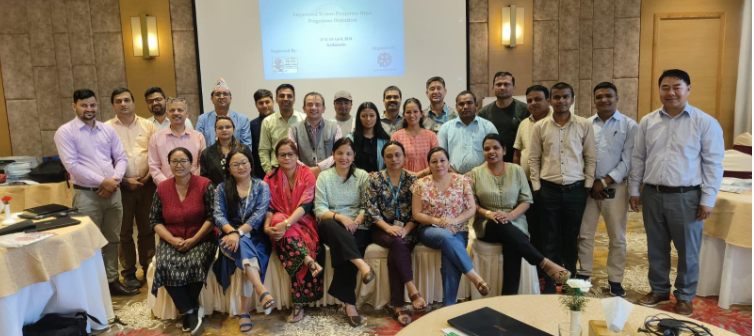
Posted On: 31st May, 2024
“Empower Women Prosperous Nepal (EWPN) Programme Orientation to the key collaborative partners of 3 provinces namely Far Western, Karnali, Bagmati and Madhes Province) on Social CFLG, Disability, Child Safeguarding Policy”
Nepal is making significant strides towards achieving the 2030 Agenda for Sustainable Development, focusing on eradicating poverty and advancing social protection, especially for children. However, the journey is fraught with challenges, including uneven fund distribution and ineffective implementation of child-centric initiatives like Child-Friendly Local Governance (CFLG). Despite increased investments, issues such as child trafficking, sexual abuse, underage marriage, and caste-based discrimination persist, disproportionately affecting vulnerable communities, especially girls. To address these issues, a comprehensive initiative has been proposed, aiming to promote CFLG, expand child assistance programs, enhance social protection measures, and revise policies for fairness and gender parity. Government commitment at all administrative levels is essential for the success and scalability of this initiative.
The Empowered Women Prosperous Nepal (EPWN) program, a collaborative effort involving Europian Union and four UN agencies, seeks to empower provincial-level organizations. It also aims to familiarize stakeholders with various forms and guidelines on Gender-Based Violence (GBV) policy, define collaboration between UN Women and the International Labour Organization (ILO), and effectively implement CFLG strategies. A pivotal event marked the launch of the EPWN program, emphasizing social protection, child-friendly governance, and disability initiatives. Held at the Crystal Pasupati Hotel in Kathmandu on 23-24 April 2024, the orientation session gathered key stakeholders, including representatives from civil society organizations such as Life Nepal Madhes Province, Kirdac Nepal Karnali, SPCSN Bagmati and Needs Nepal Far Western Province, the European Union (EU), and UN agencies (UNICEF, ILO, UNFPA, and UN Women).
The session, chaired by Mr. Tillotam Paudel of SPCSN, commenced with an opening address by Mrs. Dolma Lama, Vice-chairperson of SPCSN and hosted by Rajendra Chaulagain Program Coordinator of SPCSN. She highlighted the crucial role of social protection in national development and urged active participation. Key presentations included a comprehensive overview of EPWN by Mr. Shiva Bhandari from the EU, and Aina, detailing its collaborative approach between the Nepal government, EU, UN, and civil society organizations to advance gender equality and social inclusion. Mr. Saurav from ILO elucidated ILO’s contributions to social protection initiatives, focusing on the care economy and labor administration. Mr. Basanta Raj Gautam, a social protection expert, discussed the current implementation status of social security programs and the need for enhanced social protection frameworks.
The second day focused on recapping the previous day’s key learnings and clarifying roles and responsibilities between various agencies. There was an orientation on the EWPN program and its contributions to social protection and gender equality. Strategies for strengthening social protection, mobilizing citizen engagement, and implementing CFLG national strategy were also discussed. The event underscored several key interventions, including the promotion of CFLG to protect child rights and enhance local governance. Enhanced social protection measures targeted vulnerable groups like the girl child and Persons with Disabilities (PWDs). There was also an emphasis on gender-responsive budgeting and policy implementation aligned with EPWN objectives. Multi-sectoral approaches to address GBV and prevent sexual exploitation and abuse (PSEA) were highlighted.
A limited budget posed challenges in covering travel costs for participants from remote provinces. However, SPCSN effectively communicated with collaborative partners, ensuring local travel fare within the Kathmandu valley to facilitate participant movement. The orientation session successfully aligned stakeholders with the EPWN program’s objectives and strategies. By fostering collaboration and commitment, the program aims to advance gender equality, social inclusion, and child protection in Nepal, contributing significantly to the nation’s sustainable development goals.